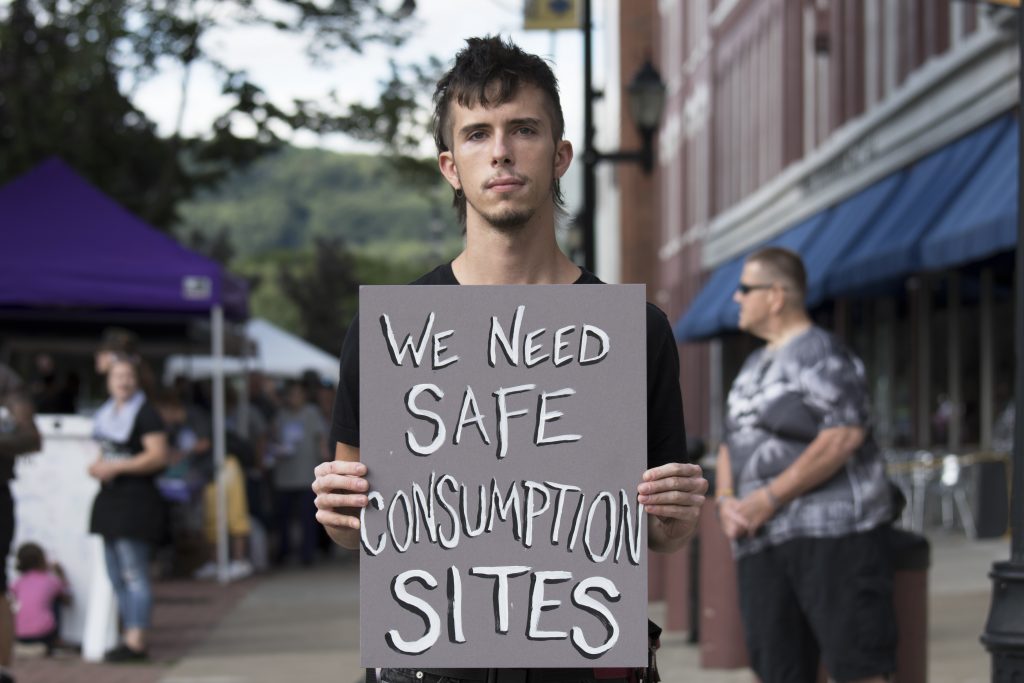In 2014, Alexis Pleus lost her son to an overdose. And on Saturday afternoon, she joined hundreds of community members at the Peacemaker’s Stage in Binghamton to honor him on International Overdose Awareness Day.
Pleus, founder and director of Truth Pharm, now works to raise awareness about the drug epidemic that kills tens of thousands of Americans annually, including 31 people in Broome County last year.
“I lost my son, Jeff, and Truth Pharm was born of that loss,” Pleus said. “My goal was to get to the root cause of the problem and to fix things so that we have less losses of Jeffs and all the other beautiful people out there.”
Truth Pharm organized its fourth-annual “Trail of Truth” to honor those lost to substance use-related causes in the Southern Tier. At the event, family members and friends created a memorial cemetery made up of poster board tombstones to illustrate their losses. Attendees also participated in overdose reversal training, and a rally was held on the stage, featuring speeches and performances. Later in the afternoon, attendees carried their loved ones’ tombstones for a memorial march to the Governmental Plaza for a live performance art piece in protest of the opioid epidemic and in honor of the lives lost to it.
The event also served as a platform to discuss the progress Truth Pharm has made — and the battles it continues to fight.
One of those challenges is tackling the stigma surrounding those struggling with addiction. Pleus said her son was a white, educated male from a middle-class home with a supportive mom and good insurance, but he was still affected by the disease that is drug addiction.
“If I focused our efforts and everything we did at Truth Pharm on fixing things for all the Jeffs in the world, we would still be losing a whole lot of lives,” Pleus said. “That’s why Truth Pharm has a very serious focus on making sure we help the most marginalized in our communities. We call ourselves an anti-racist organization, because that’s important to us. Everything that we make accessible and everything we make will help everyone — from Jeff, to the kid who is richer than Jeff, to the kid who never even had a chance in the first place — we’re going to make sure we make it accessible to everyone.”
But Truth Pharm has made other strides. Jessica Saeman, one of the organization’s ‘rainmakers,’ a term used to describe Truth Pharm members, said her mother is a nurse at Lourdes Hospital in Binghamton and has been trying to get the hospital administration on board with helping in the drug epidemic.
“I’m happy to announce [that Lourdes] now has three doctors that are prescribing medically assisted treatment,” Saeman said. “Three years ago, I never would’ve thought that any of these things that I’ve discussed today would have ever happened.”
Another speaker, L.A. Kauffman, an activist and author, spoke about responsibility through advocacy and direct action, shedding light on the ways organizations such as Truth Pharm are able to reduce harm.
“One of the crucial ways in which people have fought the opioid crisis is by mutual aid, through needle exchanges — whether its legal to exchange their syringes or not — by setting up safe injection facilities even though we know there has been resistance in every level of government to making these lifesaving institutions legal,” Kauffman said. “People are doing this work anyway … to save lives in the face of this epidemic.”
The event’s schedule staggered musical performances between speeches, featuring family members and recovering addicts singing and rapping songs about the strength for recovery and the pain that comes with losing a loved one.
“We get out there, we raise hell, we love doing that and we believe it’s really important,” Pleus said. “At the very beginning, starting Truth Pharm, I didn’t want to go around picking up the pieces for the rest of my life. I wanted to find a way to get to the root cause of this problem, and to fix it. That’s what we do — we’ve turned our grief into advocacy.”
During the rally, an organizer came to the stage and invited anyone whose life had been saved by Narcan, a naloxone spray that reverses the effects of an overdose, to come up. Over a dozen attendees voluntarily came to the stage.
After the rally concluded, families and friends picked up their loved ones’ tombstones and gathered to begin the memorial march to the Governmental Plaza.
“We call it a ‘march’ and not a ‘walk,’ because … we are warriors,” Pleus said. “We are not walking downtown, we are marching through this town to raise some hell and make sure everyone sees that our loved ones’ lives matter.”
Family members each carried one tombstone, marched from the Peacemaker’s Stage down to the end of Collier Street, coming to the Plaza to set their tombstones in wooden blocks. Then, lying down on the sidewalk in front of the memorials, each person was outlined in chalk to symbolize the lives lost to the epidemic. The chalk outlines are expected to last a few weeks, during which Truth Pharm rainmakers will be standing by to ensure the community members understand what the memorial symbolizes.
“These are not empty souls we lost,” Pleus said. “They are not invisible people. They are people who matter, who were important, who were loved. We write inside of their bodies, so that people know that they were very loved.”



